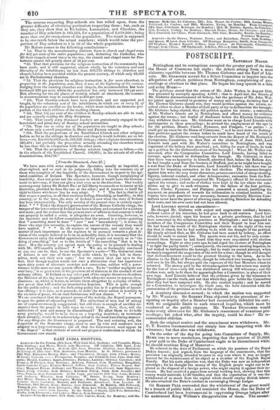[From the Standard, June 27.]
We have seen with some surprise the Spectator, usually so impartial, so clear-sighted, and so cool in its judgments, falling into the common cry of those who complain of the inactivity of the Government in respect to the agi- tated condition of Ireland. The Spectator, however, though complaining of inactivity, does not point out the manner in which it would have the Govern- ment to act—nay, it does not gives hint even as to the direction. Our weekly contemporary leaves Sir Robert Peel at full liberty to concede or to coerce at his discretion, provided he does the one or the other; and it reserves to itself the right to blame whichever line he may adopt. • • * The fact is, that in all that respect s passion in all that concerns feeling, friendship, or hostility, to this country, or to the passion, the state of Ireland is now what the state of Ireland has been immemorially. The only novelty of the present time is entirely super- ficial. • • • Under the despotic government of the Roman Catholic clergy, the temper of the lower orders in Ireland has been uniform and constant for a century and more ; and the notion that the present state of affairs in that country is what can properly be called a crisis, is altogether an error. Granting, however, to the Spectator and its fellow-complainers that the present is a crisis—granting that "something must be done ' " now " and " immediately "; it is due, by those who urge this necessity, to explain the nature of the remedy they would have applied. • * • In all matters of importance' and certainly in a matter of such importance as the regimen to be pursued towards a great di- vision of the empire believed to be in an unhealthy state, it is necessary that the Government carry the cordial approbation of the people not merely as to "the doing of something," but as to the details of " the something" that is to be done. Has the country yet agreed upon the policy to be pursued in dealing with Mr. O'Connell's sedition ? * a• We are as thoroughly convinced as any one can be, that, to use the Spectator's words—" The distracted state of Ireland is not one of those social evils which, by being left to them- selves, work out their own cure;" but we cannot shut our eyes to the fact, that though neglect would not cure a distraction that has supervened upon sixty years of alternate coercion and concession, neither will a perse- verance in the same see-saw system effect a cure. To be "neither negligent nor over busy," is as good a rule in the government of states as in the conduct of our ordinary affairs. If Ireland or any other part of the empire threatens disorders, the Minister of the day must be prepared with adequate means to repress those disorders ; or, which is better, to obviate them altogether by a display of defen- sive pow er that will render an insurrection hopeless. This is quite enough for the public safety ; and the forbearing policy has in it a principle of bound- less efficacy : it is sure, as it proceeds, to unite the whole nation in hostility to the enemies of peace, whom such forbearance will not disarm. a * * We are convinced that the present access of the malady, the Repeal paroxysm, is upon the point of exhausting itself. The collections of men and of money are of course enormously exaggerated; but still there is enough of sacrifice de- manded from the people in both ways to steary them. Now, then, will the collections of men and money be discontinued ? To allow them to dwindle away gradually, would be to lie down on a lingering deathbed ; to terminate them abruptly, would be to acknowledge defeat in the most humiliating manner. For any thing else the Government is prepared. The real enduring evil, the despotism of the Romanist clergy, must be met by wise and moderate lasts adapted to a long continuance; but all that the Government need oppose to "the Repeal" is that attitude of armed and prepared moderation in which the Government now stands.


























 Previous page
Previous page